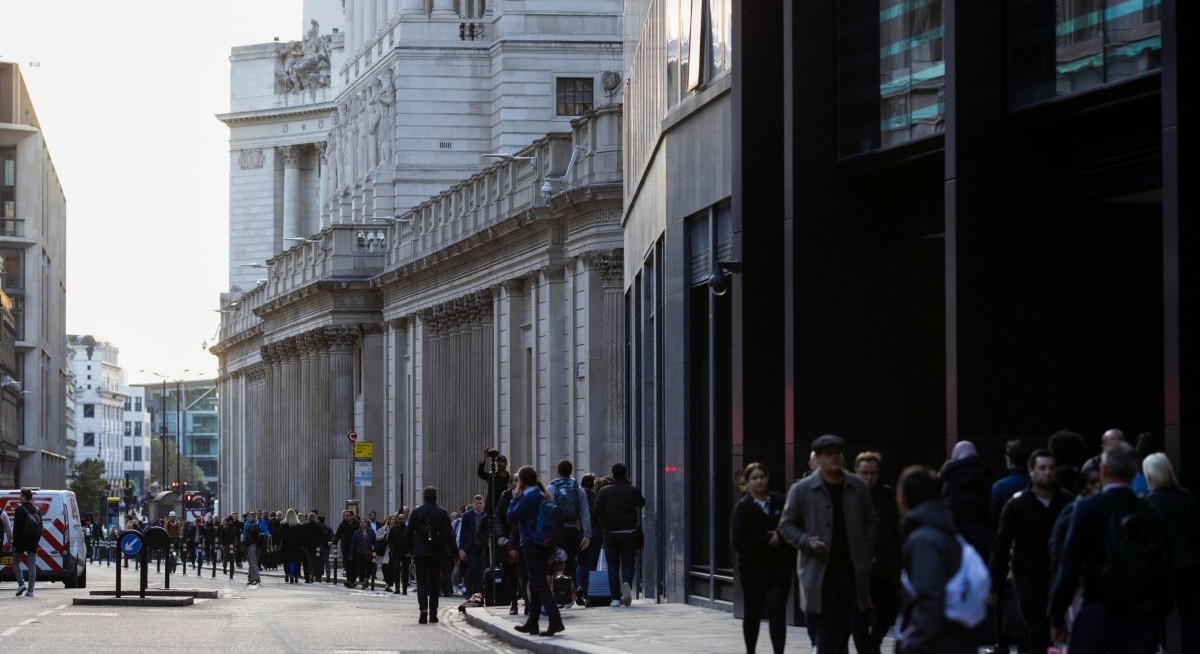After the breakdown of the Bretton Woods regime of fixed exchange rates in the early 1970s and the high inflation that followed, many central banks, including the BOE, adopted a principle laid out by Nobel Prize-winning economist Milton Friedman: that the best way to ensure steady economic growth and a robust financial system is to focus on keeping prices stable. They do this via so-called inflation targeting — explicitly aiming to keep prices going up by a small amount each year. The BOE says this makes it easier for businesses to set the right prices and for people to plan their spending.
2. Who sets the inflation target?
The BOE is tasked with achieving a rate of inflation set by the government each year. Right now that rate is 2% based on the Consumer Price Index (CPI), a goal it shares with most central banks in advanced economies. If inflation diverges by more than 1 percentage point in either direction, the bank’s governor must write to the chancellor of the exchequer — Britain’s finance minister — explaining why, and what the bank will do about it.
3. How does it keep inflation in check?
See also: BYD joins wave of firms challenging Trump’s tariffs in US court
Its main policy tool is the Bank Rate, the rate of interest it pays to commercial banks that deposit money with the BOE. For those banks, making loans to consumers and businesses is only worthwhile when it pays better than making risk-free loans to the BOE. So when the Bank Rate goes up, the banks charge everybody else more, restricting the supply of money in the economy and curbing prices. By the same token, when the Bank Rate goes down, the money supply tends to grow and prices rise. Between 1997 and the eve of the pandemic, UK inflation averaged 2% a year.
4. How has the BOE’s role evolved?
Before 1997, interest rates were set by the chancellor, with the BOE governor providing advice. Within days of taking office, Tony Blair’s Labour government gave the bank operational independence and created a nine-member Monetary Policy Committee led by the governor, a move designed to insulate monetary policy from the risk of political opportunism. The BOE was initially given an inflation-rate target of 2.5% based on the Retail Price Index excluding mortgage interest payments. In 2003, the goal was shifted to 2% based on the CPI. In 2013, the BOE saw its remit change again when George Osborne, the Conservative chancellor, said that letting inflation overshoot the target was tolerable if it was required to support growth and employment. At the time, inflation was running close to 3% and the economy was emerging from the euro area’s sovereign debt crisis.
See also: Saudis plan revised strategy for US$2 trillion economic agenda
5. What’s the problem now?
Surging costs of imported energy and food helped to push inflation to 9.9% in August, almost five times the bank’s target and higher than in other Group of Seven countries. Members of the ruling Conservative Party accused BOE Governor Andrew Bailey of missing the early signs of an explosion in prices and acting too slowly once inflation set in, increasing the likelihood of a recession. Since Prime Minister Liz Truss took office, government policy has become increasingly at odds with the BOE’s inflation-fighting remit. On Sept 23, Chancellor of the Exchequer Kwasi Kwarteng announced big tax cuts and heavy borrowing to try to kick-start the economy. The move could make it hard for the BOE to get prices back under control without fuelling a personal debt crisis and tipping the country into a prolonged recession.
6. How does Truss want to change the BOE?
Before taking office in September, Truss said the UK was facing an unprecedented economic situation and that the “business-as-usual economic strategy” is not working. The BOE should remain independent, but the time has come to revisit its mandate, she said. In a newspaper article, Truss said the commodity-induced inflation spike has been “exacerbated by monetary policy”. How she would revise the current system is unclear, though she has mentioned the possibility of widening the BOE’s target to include a measure of money supply.
7. Does money supply targeting work?
In the early 1980s, Margaret Thatcher’s government set money supply targets to grapple with double-digit inflation. The idea was to reach a certain level of money supply to keep prices stable in the long term, even if it meant higher inflation in the near term. However, the metrics being measured were volatile and sometimes contradicted other signals on the state of the economy. That led to monetary targets falling out of favour in official circles and an ill-fated shift to manipulating foreign exchange rates as a way to anchor inflation. Proponents of money supply measuring have reclaimed some authority after Tim Congdon, who advised Thatcher, predicted the latest inflation spike early on after seeing broad money growth rocket by 15% at the start of the pandemic.
8. Is the independence of the BOE at risk?
Kwarteng has said the government has an “absolute” commitment to an independent BOE and its 2% inflation target. However, some analysts have expressed concern that talk of revising the bank’s mandate raises questions about political interference in its work. Any loss of credibility for the BOE could damage the economy by making monetary policy less predictable, leading investors to demand higher returns for owning UK government debt. The chancellor has the power to change the BOE remit overnight by sending a letter to the governor. In practice, the government would probably formally consult on the matter to signal its intentions. — Bloomberg Quicktake




